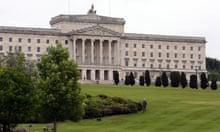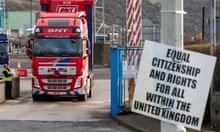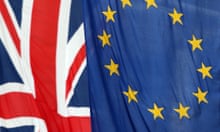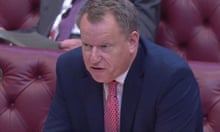Nicola Sturgeon has called on Theresa May to make Scotland’s continued membership of the single market – even if the UK leaves – “an integral element” of negotiations with the EU after triggering article 50.
While not ruling out a second independence referendum after Scotland voted decisively to remain part of the EU in June, the first minister put forward a technically complex series of proposals aimed at maintaining trade and freedom of movement regardless of the UK’s final deal, but which would require significant further transfer of powers from Westminster to Holyrood.
Launching the document, Scotland’s Place in Europe, in Edinburgh on Tuesday, Sturgeon described it as “detailed, serious and reasonable and … aimed first and foremost at the UK government.” She appeared determined to place the onus firmly with May, emphasising that this was an example of the Scottish government’s willingness to compromise.
“[It is] a serious and genuine attempt to build as much consensus as possible, to square the circle and to unify the country around a clear plan to protect our interests. I hope and expect that the UK government in considering these proposals will demonstrate the same flexibility,” she said.
At the heart of the paper is a Norway-style framework to maintain Scotland’s place within the single market – even if the rest of the UK opts for a hard Brexit – by becoming a full or associate member of the European Free Trade Association (Efta) and thereafter becoming party to Efta’s European Economic Area (EAA) agreement.
On Monday, May pledged to look “very seriously” at the proposals, although earlier this month the chancellor, Philip Hammond, appeared to rule out any special Scottish deal on trade or immigration.
Questioned by the Commons liaison committee on Tuesday, May suggested plans put forward by devolved nations may be “impractical”.

Sturgeon adopted an emollient tone throughout a media briefing at her official residence, Bute House, saying she was not prioritising membership of the single market over continued free trade across the UK, and insisting continued freedom of movement would not be exploited by those seeking to settle in England via Scotland.
Challenged as to how realistic the proposals were, Sturgeon referred to discussions the Scottish government had already held with the EFTA as well as individual EU countries, saying: “What I do know is how much goodwill there is towards Scotland and how much of a recognition there is that Scotland as a country wants to continue to play a part in the European family of nations. So I believe this is achievable.”
She stressed that a second independence referendum would remain on the table. The document states: “By retaining membership of the European single market we can both mitigate the worst damage of leaving the EU and ease the transition to a full independent member state should the people of Scotland decide to choose that future.”
The paper proposes that Scotland gains a raft of additional powers in order to facilitate a differentiated deal, resulting in a “fundamental reconsideration of the UK’s constitutional arrangements”.
These include powers from Brussels being repatriated to the UK, such as agriculture, fisheries and environmental protection, as well as powers not currently devolved, including employment law, immigration and import and export control.
Sturgeon said powers over immigration were increasingly vital for the protection of Scotland’s interests, and she raised the possibility of a differentiated immigration system across the UK.
She said she believed there was “a groundswell around further devolution of immigration”, noting calls by the London mayor, Sadiq Khan, for greater flexibility.
Arguing that limits on freedom of movement had the potential to seriously harm Scotland’s long-term economic future, Sturgeon denied this could leave the rest of the UK open to cross-border abuse.
“The possibility of someone exercising their freedom of movement to come to Scotland then seeking to settle in the rest of the UK – that would be dealt with by the immigration rules that apply in the rest of the UK,” she said.
“People coming into the UK under the differentiated proposal would continue to have to show their passports. Freedom of movement within the UK would continue to be governed by the rules of the common travel area.”
Sturgeon denied that the differentiated deal would create a hard border with England. “Talk of a hard border for Scotland has always rung hollow from a UK government that says no such hard border will be required between a post-Brexit UK and the Republic of Ireland, a continuing member of the EU and customs union.”
She went on: “That argument aside, this paper sets out how free movement of goods, services and people would continue across the UK even with Scotland in the single market and the rest of the UK not. If the UK opts to leave the customs unions then Scotland, in common with other Efta/EEA countries, would not be in the customs union either … The border between Scotland and England would not be an external EU customs border.”
The document is expected to be discussed in detail when the UK government and devolved administrations meet at the next joint ministerial committee in January.









